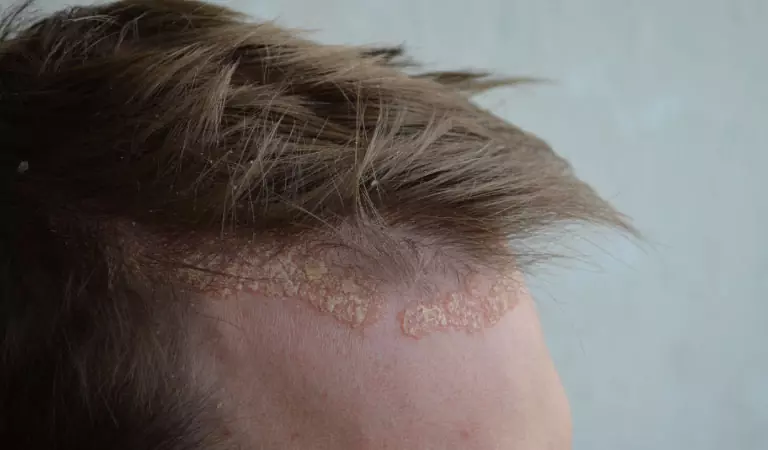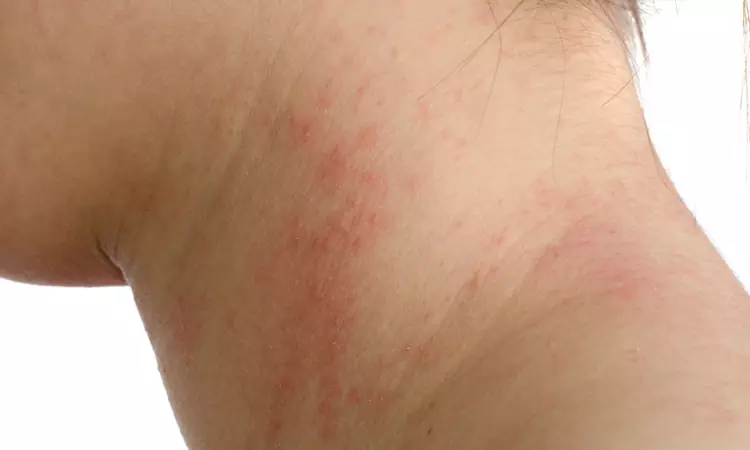Psoriasis Treatment in Dubai and Abu Dhabi, UAE
At Dr Batra's® Clinics, we offer personalized, homeopathy-based psoriasis treatment in Dubai that targets the root causes of the condition. With decades of experience and advanced technology, our expert doctors provide safe, natural treatments that are customized to your specific skin needs. We have successfully treated more than 10000 + cases globally psoriasis cases by focusing on improving overall skin health and delivering long-term relief without harmful side effects.
If you're looking for expert care and effective treatment for Psoriasis, trust Dr Batra's® Clinics to provide a comprehensive plan that helps restore your skin and your confidence.
What is Psoriasis Treatment? (Homeopathy)
Psoriasis treatment aims to slow down the rapid growth of skin cells and reduce the appearance of scales. Some of the treatment options for psoriasis include topical creams, ointments, light therapy, etc.
However, the choice of treatment depends on the severity of your condition and your body's response to past treatments. Thus, you would need to experiment with different medications or combinations of therapies to find what works best.
Reviews of Our Psoriasis Treatments in Dubai
Here are just a few of the reviews from patients who have successfully undergone Psoriasis treatment at Dr Batra's®:
Why Choose Dr Batra's® for Psoriasis Treatment in UAE
Dr. Batra's® is a trusted name in holistic healthcare, especially renowned for its expertise in treating various skin conditions, including psoriasis. Here's why Dr. Batra's® is a preferred choice for psoriasis disease treatment:
- Specialized Approach: Dr. Batra's® offers a specialized approach to treating psoriasis. Their experienced dermatologists tailor treatment plans to each patient's specific condition, considering factors like the severity of psoriasis, individual medical history, and lifestyle.
- Advanced Technology: Dr. Batra's® employs advanced technology and international equipment for diagnosing and treating psoriasis. This ensures accurate diagnosis and effective treatment.
- Natural Treatment: Dr. Batra's® emphasizes natural treatment methods alongside conventional medicine. We offer homeopathic treatments that are safe, non-toxic, and free from side effects, providing relief from psoriasis symptoms without causing harm to the body.
- Personalized Care: Patients at Dr. Batra's® receive personalized care and attention throughout their treatment journey. The doctors and support staff are compassionate and dedicated to helping patients manage their psoriasis effectively.
- Proven Track Record: With 35+ years of experience and a proven track record of successfully treating psoriasis, Dr. Batra's® has earned the trust of thousands of patients worldwide.
- Comprehensive Approach: Dr. Batra's® takes a comprehensive approach to psoriasis treatment, addressing not only the physical symptoms but also the emotional and psychological impact of the condition. We offer counseling and support services to help patients cope with the challenges of living with psoriasis.
- Follow-up Care: After the initial treatment, our skin experts provides regular follow-up care to monitor progress and make any necessary adjustments to the treatment plan. This ensures that patients continue to experience relief from psoriasis symptoms in the long term.
Overall, Dr. Batra's® is known for its holistic approach, advanced technology, personalized care, and commitment to helping patients with psoriasis lead healthier, happier lives.
Homeopathy Treatment and Medications For Psoriasis
Homeopathy offers a holistic approach to treating psoriasis, focusing on stimulating the body's innate healing abilities without the use of conventional medications. Instead of targeting specific symptoms with drugs, homeopathy aims to address the underlying imbalances that contribute to psoriasis.
In homeopathic psoriasis treatment, a thorough assessment of the individual's physical symptoms, emotional state, and lifestyle factors is conducted to tailor a personalized approach. This involves understanding the unique expression of psoriasis in each person and identifying the factors that may be triggering or exacerbating the condition.
Homeopathic remedies are then selected based on this comprehensive evaluation. They undergo a process of dilution and succussion to enhance their healing properties with no side effects.
The choice of homeopathy psoriasis medicines depends on the specific symptoms experienced by the individual. Alongside the use of homeopathic remedies, lifestyle modifications and dietary changes may be recommended to support the healing process. This could include stress management techniques, dietary adjustments, and avoiding triggers known to exacerbate psoriasis.
It's important to note that homeopathic treatment for psoriasis requires patience and commitment, as healing often occurs gradually over time. Regular follow-ups with a qualified homeopath are essential to monitor progress and make any necessary adjustments to the treatment plan.
Overall, homeopathy psoriasis treatment in Dubai offers a gentle and natural approach to managing psoriasis, focusing on restoring balance to the body and promoting overall well-being without the use of conventional medications.
Some common homeopathic medicines for psoriasis include Arsenicum Album, Graphites, Sulphur, Calcarea Carbonica, Mezereum, and Natrum Muriaticum. These remedies are known to help manage symptoms like dry, scaly, or inflamed skin. However, it's essential to note that the effectiveness of homeopathic treatment depends on individual cases, and consulting a doctor is crucial to ensure the most appropriate remedy is prescribed.
Understanding Psoriasis
Psoriasis is a chronic autoimmune condition characterized by patches of red, inflamed skin covered with silvery scales. In homeopathy, the approach is holistic, addressing not only the physical symptoms but also the mental and emotional state of the individual. This involves recognizing underlying imbalances in the body's energy that manifest as skin symptoms. Homeopathy seeks to stimulate the body's natural healing ability by selecting remedies that match the individual's unique symptoms and overall health.
Psoriasis commonly affects areas like the elbows, knees, and scalp, though it can appear anywhere on the body. It is not contagious but can have a hereditary component. While there is no cure, various treatments help manage symptoms and improve quality of life.
According to the World Psoriasis Day consortium, around 125 million people worldwide, or about 2 to 3 percent of the population, are living with psoriasis. About 30 percent of those affected may develop psoriatic arthritis. Additionally, research from the NIH suggests psoriasis may be underdiagnosed in people with skin of color due to differences in clinical presentation, highlighting the need for better awareness and diagnosis in diverse populations.
Psoriasis Causes
The exact cause of psoriasis is not fully understood, but it is believed to involve a combination of genetic predisposition and environmental factors. Here are some key factors thought to contribute to the development of psoriasis:
- Genetics: Psoriasis tends to run in families, suggesting a genetic predisposition to the condition. Certain genetic variations may make some individuals more susceptible to developing psoriasis.
- Immune System Dysfunction: Psoriasis is considered an autoimmune disease, which means the immune system mistakenly attacks healthy cells in the body. In psoriasis, immune cells called T cells become overactive and trigger inflammation in the skin, leading to the characteristic symptoms of the condition.
- Environmental Triggers: Various environmental factors can trigger or exacerbate psoriasis flare-ups in susceptible individuals. These triggers may include stress, skin injuries (such as cuts or sunburn), infections (such as strep throat or skin infections), certain medications (such as lithium, beta-blockers, and antimalarial drugs), and changes in weather or climate.
- Inflammatory Pathways: Psoriasis involves complex inflammatory pathways in the body, including the release of cytokines (proteins that regulate inflammation) and other signaling molecules. These inflammatory processes contribute to the development of psoriatic lesions and other symptoms.
- Lifestyle Factors: Certain lifestyle factors, such as smoking, obesity, and heavy alcohol consumption, have been associated with an increased risk of developing or exacerbating psoriasis. These factors may interact with genetic and environmental influences to contribute to the development and severity of the condition.
While these factors are believed to play a role in the development of psoriasis, the condition is complex, and individual experiences can vary widely. Research into the underlying psoriasis causes continues to shed light on its mechanisms and potential new treatment approaches.
Psoriasis Signs & Symptoms
Psoriasis can be caused in various ways, and its signs and symptoms can vary depending on the type of psoriasis and the individual. Here are some common signs and symptoms associated with psoriasis:
- Red, Raised Patches of Skin: The most typical symptom of psoriasis is the appearance of red, raised patches of skin, often covered with silvery scales. These patches, known as plaques, can develop anywhere on the body but are most commonly found on the elbows, knees, scalp, lower back, and buttocks.
- Itching and Irritation: Psoriasis plaques can be itchy and may cause discomfort or irritation, especially if they crack and bleed. Scratching can worsen symptoms and may lead to further skin damage or infection.
- Dry, Cracked Skin: Psoriasis can cause the skin to become dry, cracked, and prone to bleeding, particularly in areas where plaques develop. This dryness can contribute to discomfort and may require regular moisturizing to alleviate symptoms.
- Thickened or Pitted Nails: Some individuals with psoriasis may experience changes in their nails, such as thickening, pitting (small dents or pits), discoloration, or separation from the nail bed. Nail psoriasis can be painful and may affect the appearance and function of the nails.
- Joint Pain and Swelling: In some cases, psoriasis can also affect the joints, leading to a condition known as psoriatic arthritis. Symptoms of psoriatic arthritis may include joint pain, stiffness, swelling, and reduced range of motion. Psoriatic arthritis can affect any joint in the body and may vary in severity.
- Inverse Psoriasis: This type of psoriasis appears as smooth, red patches of skin in skin folds, such as the armpits, groin, and under the breasts. Inverse psoriasis can be particularly uncomfortable due to the sensitivity of these areas.
- Guttate Psoriasis: Guttate psoriasis often develops suddenly and appears as small, red, scaly spots on the skin, typically following a bacterial or viral infection. This type of psoriasis is more common in children and young adults.
It's important to note that psoriasis symptoms can come and go in cycles, with periods of flare-ups followed by periods of remission. Additionally, the severity and extent of symptoms can vary widely among individuals. If you suspect you may have psoriasis or are experiencing any of these symptoms, it's essential to consult a healthcare professional for an accurate diagnosis and appropriate psoriasis therapy.
Types Of Psoriasis
Psoriasis is a diverse condition that can cause in several different forms. Here are some of the most common types of psoriasis:
Plaque Psoriasis
This is the most prevalent form of psoriasis, accounting for about 80% of cases. It is characterized by raised, red patches of skin (plaques) covered with silvery scales. These plaques can appear anywhere on the body, but they often develop on the elbows, knees, scalp, lower back, and buttocks.
Guttate Psoriasis
Guttate psoriasis typically occurs in childhood or young adulthood and is often triggered by a bacterial or viral infection, such as strep throat. It appears as small, red, scaly spots on the skin, resembling drops, and can affect large areas of the body.
Inverse Psoriasis
This type of psoriasis appears as smooth, red patches of skin in skin folds, such as the armpits, groin, under the breasts, and around the genitals. Unlike plaque psoriasis, the skin in these areas may not develop scales due to the moisture and friction present.
Pustular Psoriasis
Pustular psoriasis is characterized by pus-filled blisters (pustules) surrounded by red, inflamed skin. These pustules can develop on localized areas of the body, such as the hands and feet (palmoplantar pustulosis), or cover larger areas. Pustular psoriasis can be painful and may be accompanied by fever and other systemic symptoms.
Erythrodermic Psoriasis
This is a rare but severe form of psoriasis that can affect the entire body. It causes widespread redness, severe itching, and shedding of the skin in sheets. Erythrodermic psoriasis can be life-threatening and requires immediate medical attention.
Nail Psoriasis
Psoriasis can also affect the nails, causing changes such as pitting (small dents or pits), discoloration, thickening, and separation from the nail bed. Nail psoriasis can be painful and may affect the appearance and function of the nails.
Psoriatic Arthritis
While not a form of psoriasis that affects the skin directly, psoriatic arthritis is a type of inflammatory arthritis that can develop in people with psoriasis. It causes joint pain, stiffness, swelling, and reduced range of motion and can lead to joint damage if left untreated. Homeopathy medicine for psoriatic arthritis treatment addresses the root cause of the condition.
Scalp Psoriasis
Scalp psoriasis, a common type of psoriasis, a persistent autoimmune ailment impacting the skin, cause as raised, red, scaly patches on the scalp. These patches can provoke itching, discomfort, and occasional bleeding. The condition stems from an immune system malfunction, prompting rapid growth of skin cells. Consequently, excess skin cells accumulate, forming scales and red patches. Severe cases may lead to hair loss. While scalp psoriasis can arise at any age, it typically emerges between 15 and 35 years old. Notably, it is neither contagious nor linked to poor hygiene. Homeopathy offer safe and effective scalp psoriasis treatment and management options. Consulting a homeopathic dermatologist is advisable for best scalp psoriasis care.
Each type of psoriasis presents its own set of challenges and may require tailored psoriasis therapy approaches. It's essential for individuals with psoriasis to work closely with healthcare professionals to manage their symptoms effectively.
Emotional And Social Impact Of Psoriasis
According to a study published by the National Library of Medicine (NLM), individuals with psoriasis face significantly heightened risks of depression and anxiety. The research reveals alarming statistics, with approximately 28.6% of psoriasis patients experiencing depression and about 41.4% grappling with anxiety. The visibility of the condition often triggers feelings of shame and embarrassment, contributing to low self-esteem and self-worth among those affected. Consequently, individuals may withdraw from social interactions, fearing negative judgment or stares, which can lead to social isolation. In severe cases, the emotional toll of psoriasis can become unbearable, with studies indicating that up to 10% of patients may contemplate suicide. These findings underscore the urgent need for comprehensive support and intervention strategies to address the psychological impact of psoriasis on affected individuals.
Overall, psoriasis is not just a skin condition; it can have profound effects on a person's emotional well-being, social interactions, and overall quality of life. It's important for individuals living with psoriasis to seek support and resources to help them cope with these challenges effectively.
What Triggers Psoriasis?
Psoriasis triggers can vary from person to person, but some common triggers include:
- Stress: Stress is a significant trigger for many people with psoriasis. High levels of stress can exacerbate symptoms or even lead to flare-ups.
- Infections: Certain infections, such as strep throat or skin infections, can trigger or worsen psoriasis symptoms in some individuals.
- Injury to the Skin: Any trauma to the skin, such as cuts, scrapes, bug bites, or sunburns, can trigger psoriasis symptoms in the affected area. This phenomenon is known as the Koebner response.
- Weather: Changes in weather or climate, particularly cold, dry conditions, can trigger psoriasis flare-ups for some individuals. Conversely, some people may experience worsening symptoms in hot, humid weather.
- Medications: Certain medications, such as lithium, beta-blockers, antimalarial drugs, and some medications used to treat bipolar disorder or high blood pressure, can trigger or exacerbate psoriasis symptoms in some people.
- Alcohol and Smoking: Excessive alcohol consumption and smoking have been associated with an increased risk of developing psoriasis and may also trigger flare-ups in individuals who already have the condition.
- Hormonal Changes: Fluctuations in hormone levels, such as those that occur during puberty, pregnancy, or menopause, can trigger or worsen psoriasis symptoms in some individuals.
It's essential for individuals with psoriasis to identify their specific triggers and take steps to avoid or manage them as part of their overall treatment plan. Keeping a journal to track flare-ups and potential triggers can be helpful in identifying patterns and making lifestyle adjustments accordingly. Additionally, working closely with a healthcare provider or dermatologist can help develop a personalized treatment approach that addresses both the symptoms and triggers of psoriasis.
Diagnosis Of Psoriasis
A recent study in the Journal of the European Academy of Dermatology and Venereology highlights homeopathy's potential to enhance psoriasis patients' quality of life and symptom alleviation, sans adverse effects. Homeopathy aims at restoring bodily equilibrium, health, and vitality. To ensure optimal therapy for psoriasis, seeking guidance from certified homeopathy experts is imperative.
Utilizing Dr. Batra's® 3D Skin Analyzer, an advanced tool tailored for skin analysis, our doctors gain further insights into your skin condition. Following a meticulous assessment, our specialists tailor a personalized homeopathic treatment for psoriasis management, integrating homeopathic medications, dietary adjustments, and skincare recommendations.
Other Complications Of Psoriasis
Psoriasis, while primarily a skin disorder, can trigger a cascade of complications that extend beyond dermatological concerns. Among these are psoriatic arthritis, a form of inflammatory arthritis affecting joints and connective tissues, often leading to pain, stiffness, and reduced mobility. Additionally, individuals with psoriasis have an increased risk of developing cardiovascular conditions such as hypertension, heart disease, and stroke. Furthermore, the chronic inflammation associated with psoriasis can contribute to obesity and insulin resistance, raising the likelihood of developing type 2 diabetes. Mental health challenges, including depression and anxiety, are also prevalent among psoriasis patients, highlighting the need for comprehensive care to address both physical and emotional well-being.
When To See A Doctor
If you suspect you have psoriasis or if your symptoms worsen, it’s important to consult a doctor. Seek medical advice if you experience persistent red, scaly patches on your skin, severe itching, or joint pain and swelling. Additionally, if psoriasis affects your daily activities, mental health, or if over-the-counter treatments fail to provide relief, a doctor’s evaluation is crucial. Early intervention can prevent complications and improve your quality of life. Regular check-ups are also important if you have a family history of psoriasis or related conditions, ensuring timely and effective management.
Self-Help Tips to Prevent Psoriasis
Preventing psoriasis flares involves a combination of lifestyle changes, stress management, and proper skin care. Here are some self-help tips to help manage and prevent psoriasis:- Maintain a Healthy Die
- Keep Your Skin Moisturized
- Manage Stress
- Avoid Skin Injuries
- Limit Alcohol Consumption
- Quit Smoking
- Avoid Triggers
- Regular Medical Check-Ups
- Gentle Skincare Routine
Conclusion
At Dr. Batra's®, we understand psoriasis as a complex autoimmune disorder affecting both physical and emotional well-being. Our holistic approach combines advanced technology with personalized homeopathic care, ensuring each patient receives tailored treatment. Our team of dermatologists and homeopaths collaborates to provide accurate diagnosis, individualized treatment plans, and ongoing support, drawing on over 35 years of experience in managing psoriasis effectively and safely. Choose Dr. Batra's® for compassionate, effective care that helps you lead a healthier, happier life, free from psoriasis discomfort and stigma.







